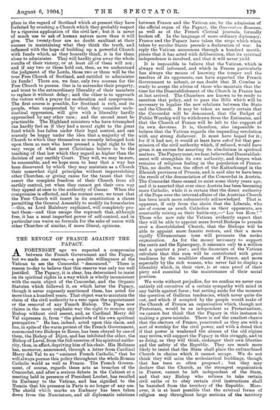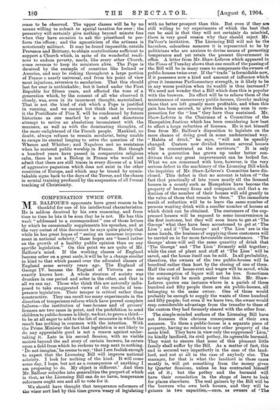A FORTNIGHT ago we expected a compromise between the French Government
and the Papacy, but we made one reserve,—a possible willingness at the Vatican to see the Concordat " denounced." There is reason to-day to believe that this reserve was only too well justified. The Papacy, it is clear, has determined to insist i on its spiritual rights in a way which is wholly inconsistent with the main object of the Concordat, and the Organic Statutes which followed it, on which latter the Papacy, though it never expressly sanctioned them, has acted for more than a hundred years. That object was to maintain the claim of the civil authority to a veto upon the appointment or the removal of any French Bishop. The Pope now claims in the most emphatic way the right to remove any Bishop without civil assent, and, as Cardinal Merry del Val expresses it, from " the plenitude of his own spiritual prerogative." He has, indeed, acted upon this claim, and has, in spite of the warm protest of the French Government, summoned two Bishops to Rome, has been obeyed by one of them, the Bishop of Dijon, and has inhibited the other, the Bishop of Laval, from the full exercise of his spiritual autho- rity, thus, in effect, depriving him of his chair. His Holiness has, moreover, announced, through a letter from Cardinal Merry del Val to an " eminent French Catholic," that he will always pursue this policy throughout the whole Roman Catholic world as well as France. The French Govern- ment, of course, regards these acts as breaches of the Concordat, and after ,a serious debate in the. Cabinet at a Meeting held in presence of President Loubet, has recalled its Embassy to the Vatican, and has signified to the Nuncio that his presence in Paris is no longer of any use. The shield which marks an Embassy has been taken down from the Nunciature, and all diplomatic relations between France and the Vatican are, by the admission of the official organ of the Papacy, the Osservatore Romano, as well as of the French Clerical journals, formally broken off. In the language of more ordinary diplomacy, France and the Papacy have taken the steps which when taken by secular States precede a declaration of war. In reply the Vatican announces through a hundred mouth- pieces that it has acted with deliberation, that its spiritual independence is involved, and that it will never yield.
It is impossible to believe that the Vatican, which is always well informed, and which in France particularly has always the means of knowing the temper and the resolves of its opponents, can have expected the French Government to submit, or can doubt that M. Combos is ready to accept the advice of those who maintain that the time for the Disestablishment of the Church in France has at last arrived. The Chambers are known to be ready to sanction that policy, and to pass the Bills which will be necessary to legalise the new relations between the State and the Church. It may be taken as nearly certain that the Concordat will be denounced, that the Budget of Public Worship will be withdrawn from the Estimates, and that the Church of France will be left to the support of its own devotees. It is, therefore, also impossible to believe that the Vatican regards the impending revolution with any strong disfavour. It must have hoped for it ; for if it had not, it would at least have asked for that per- mission of the civil authority which, if refused, would have given it an excuse for asserting its absolutism in spiritual matters. The Papacy must, we fear, believe that Disestablish- ment will strengthen its own authority, and deepen what remains of religious feeling in the population of France. This, no doubt, was the effect of the Kulturkampf in the Rhenish provinces of Prussia, and is said also to have been the result of the denunciation of the Concordat in Austria. The Concordat there ceased to exist some thirty years ago, and it is asserted that over since Austria has been becoming more Catholic, while it is certain that the direct authority of the Pope over the internal affairs of the Austrian Church has been much more submissively acknowledged. That is apparent, if only from the shout that the Liberals, who are of course as much Catholics as their opponents, are constantly raising as their battle-cry,—" Los von Rom ! " Those who now rule the Vatican evidently expect that they will be able to appoint more fervid Bishops to preside over a disestablished Church, that the Bishops will be able to appoint more fanatic rectors, and that a more rigidly Ultramontane tone will permeate the entire organisation. As for the money necessary to support the cures and the Episcopacy, it amounts only to a million and a quarter a year ; and the financiers of the Vatican calculate that this sum will be contributed with great readiness by the wealthier classes of France, and more especially by the rich women, who never fail to display a. liberality which, in their view, is at once proof of their piety and essential to the maintenance of their social position.
We write without prejudice, for we confess we never can entirely rid ourselves of a certain sympathy with mind in any battle against force ; but setting aside for the moment the question of Gallican tendencies, which never quite die out, and which if accepted by the people would make of the Church of France an organisation which, though not Protestant, would be as independent as Protestantism, we cannot but think that the Papacy in this instance is making a grave mistake. There is not the smallest chance that the electors of France, penetrated as they are with a sort of worship for the civil power, and with a dread that if that power is weakened the abuses of the old regime may revive, will support the Papacy in this struggle, and in so doing, as they will think, endanger their own liberties and the safety of the Republic. They are much more likely to insist that the State shall place the enfranchised Church in chains which it cannot escape. We do not think they will seize the ecclesiastical buildings, though that has been so often proposed ; but they may declare that the Church, as the strongest organisation in France, cannot be left independent of the State, and that any Bishop who refuses to take certain civil oaths or to obey certain civil instructions shall be banished from the territory of the Republic. More- over, it is at least possible that the external forms of religion may throughout large sections of the territory cease to be observed. The upper classes will be by no means willing to submit to special taxation for ever ; the peasantry will certainly give nothing beyond minute fees when they have occasion to ask the priesthood to per- form the offices ; and the agnosticism of the artisans is notoriously militant. It may be found impossible, outside Provence and Brittany, to obtain contributions sufficient to support a Church which, in spite of its wonderful readi- ness to endure poverty, needs, like every other Church, some revenue to keep its ministers alive. The Pope is deceived by the example of countries like Ireland or America, and may be risking throughout a large portion of France a nearly universal, and from his point of view most injurious, reversion to secularism. That this should last for ever is unthinkable ; but it lasted under the First Republic for fifteen years, and affected the tone of a generation which, by the consent of all who observed it closely, was, even in its innermost thought, materialised. That is not the kind of risk which a Pope is justified in running, and we cannot but think that in running it the Pontificate of Pius X. will be condemned by future historians as one marked by a rash and disastrous • attempt to revive an absolutism inconsistent with the manners, as well as with the dominating thoughts, of the more enlightened of the French people. Mankind, no doubt, always refuses to remain secularist, being unable to escape its eternal longing to solve the question of the Whence and Whither; and Napoleon met no resistance when he restored public worship in France. But though a hundred years have passed in comparative religious calm, there is not a Bishop in France who would not admit that there are still traces in every diocese of a kind of aggressive paganism which does not exist in the other countries of Europe, and which may be traced by unmis- takable signs back to the days of the Terror, and the chasm in mental training produced by the suspension of all formal teaching of Christianity.







































 Previous page
Previous page